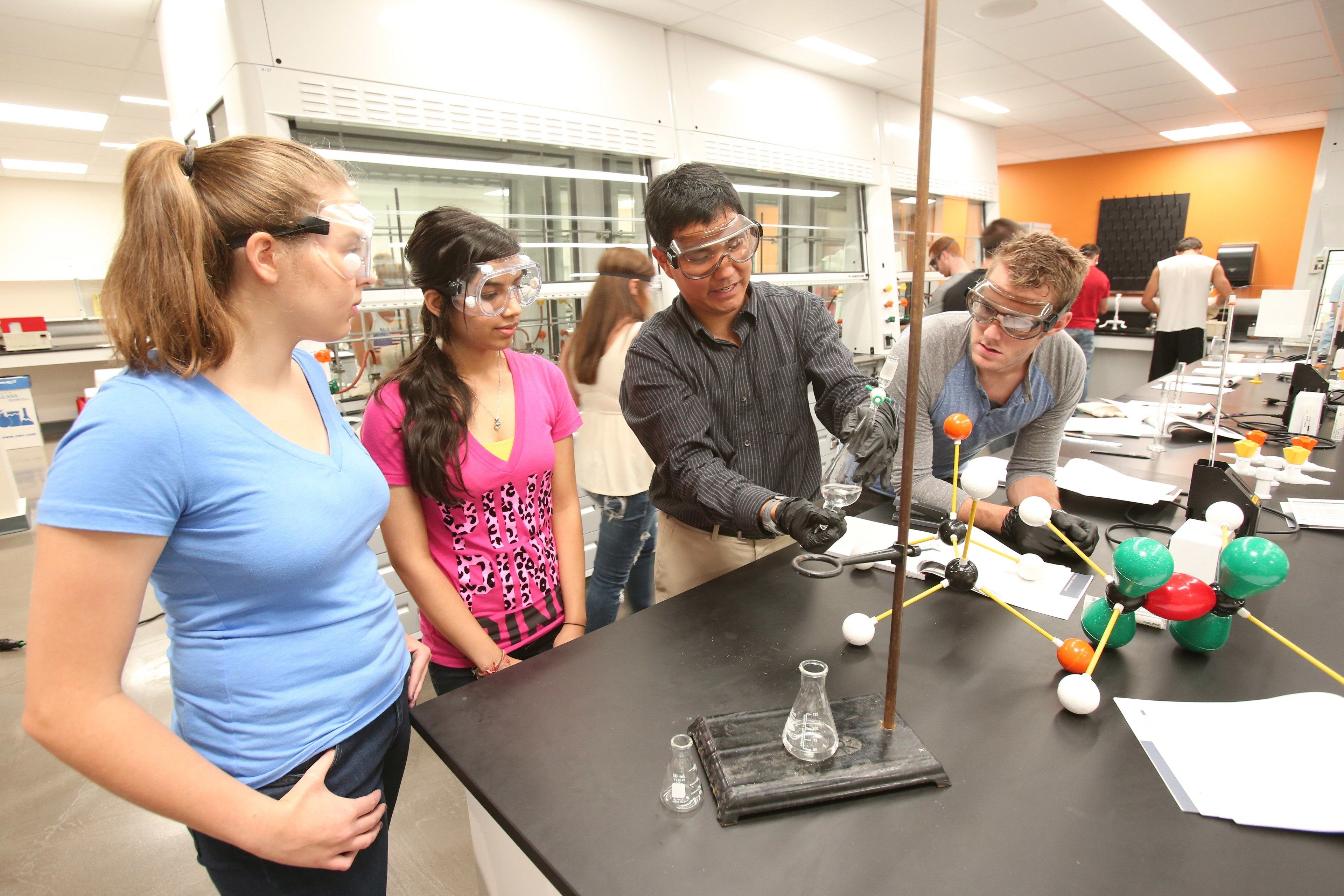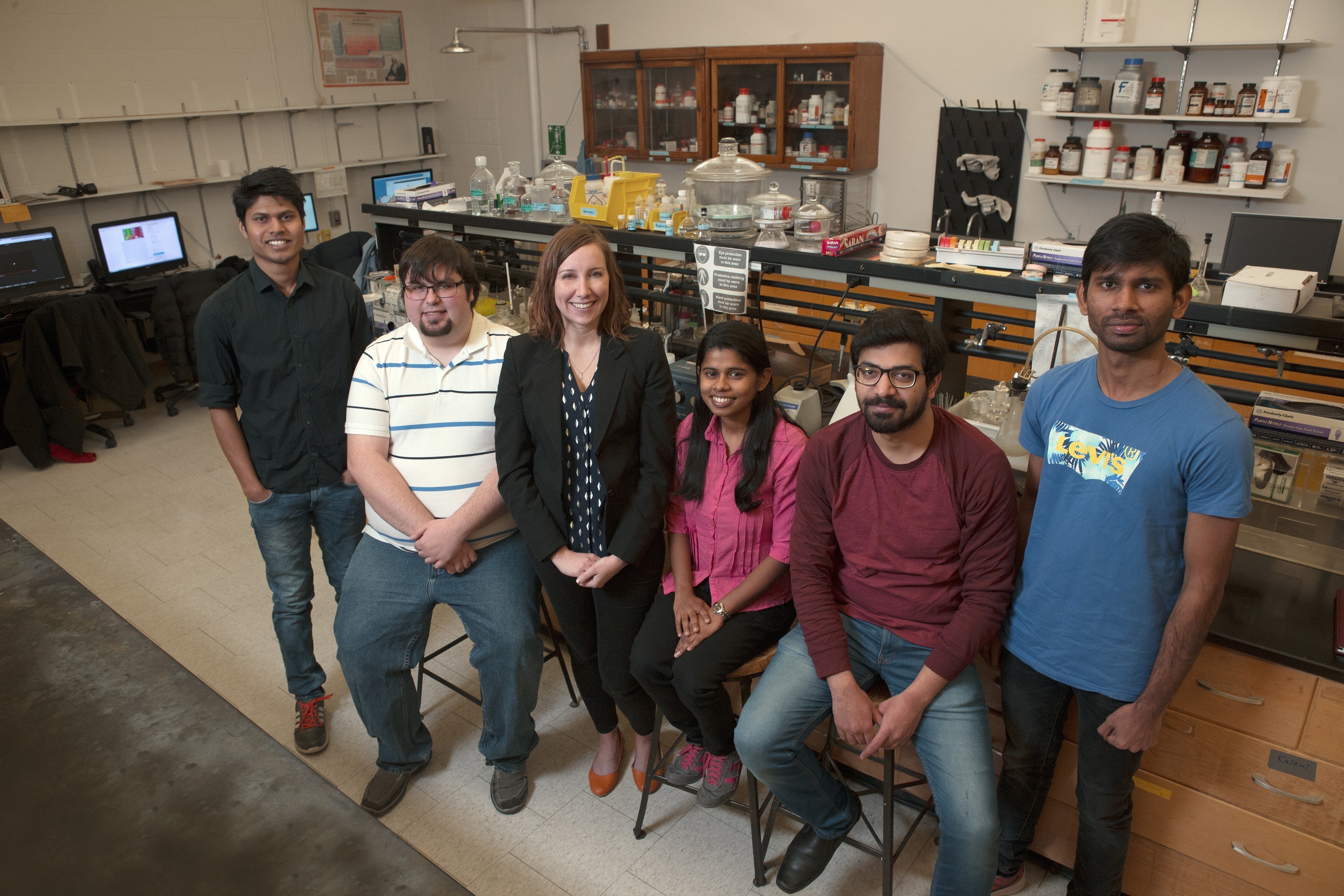Nationally recognized for student experience
The Wall Street Journal

Bachelor of Science (B.S.)
Minor
Chemistry
Chemistry is sometimes called “the central science” because it connects and intersects with so many other fields, such as physics, biology and environmental sciences. A chemistry degree is considered one of the most versatile in the sciences.
The BGSU Chemistry Department offers a broad-based, rigorous education to ensure graduates have the intellectual, experimental and communication skills to excel. Chemistry degree majors can opt to narrow their academic focus in the high-demand biochemistry specialization.
With a chemistry degree from BGSU, you’re not just studying molecules and atoms and chemical reactions. You learn how to apply your knowledge of the invisible bonds that shape so much of our world to overcome real life challenges – from new medicines to cleaner energy to groundbreaking technology.
Graduates of the Bachelor of Science in chemistry program at Bowling Green State University have their pick of rewarding career paths: Environmental research, biochemistry, forensic science, product development, material science, food science and more.
With further study, students can attend professional schools such as medical, dental, veterinary schools or fine-tune their skills with a masters or PhD in chemistry. Professionals with chemistry degree jobs solve complex environmental challenges, promote safer products and develop breakthroughs invaluable to the health, advancement and sustainability of our society.
Why study chemistry at BGSU in Ohio?
- Small class size. BGSU undergraduate chemistry degree students benefit from small class sizes and individualized academic attention.
- Top-rated faculty. Our chemistry faculty members have extensive research experience and are internationally recognized as leading experts in the field.
- State-of-the-art facilities and instrumentation. Moseley Hall houses an interdisciplinary science complex featuring flexible laboratory and classroom spaces. Undergraduates are trained to use new instrumentation in our nuclear magnetic resonance (NMR) and mass spectrometry facilities.
- American Chemical Society certification. Chemistry graduates are eligible for certification with the American Chemical Society (ACS) with appropriate selection of electives. The ACS is the world’s largest scientific society and premier home of chemistry professionals.
- Join the club. Chemistry club is an academic and social organization that connects chemistry and biochemistry students.
- Abundant research prospects. BGSU supports trailblazing chemistry research opportunities for faculty and students.
- Great job prospects. Our graduates are competitive in the job market and have been hired by top-notch employers such as First Solar, NAMSA, Sherwin-Williams, Procter & Gamble and Wacker Chemical Corporation.
- Graduate options. Take your learning to the next level with a BGSU M.S. degree in chemistry or a Ph.D. in photochemical sciences.
Job opportunities for those with a chemistry degree are expected to grow 8% faster than average.
U.S. Bureau of Labor Statistics
#1 public university in Ohio for career prep
The Wall Street Journal
Career - what can you do with a chemistry degree?
Graduates with a chemistry degree have a lot of career options.
- They might become an environmental chemist, working to curb the impacts of pollution or climate change through analysis of soil, water and air.
- In the tech industry, chemists create new materials for everything from smartphones to renewable energy solutions.
- Analytical chemists may work in forensics or food science, monitoring the quality of what we consume.
- Those with a love for discovery may work as research chemists, creating new compounds, or biochemists, studying the chemical processes of living things.
Duties often include a mix of lab work, analysis and team collaboration.
Successful chemists start with intellectual curiosity, persistence and precision. At BGSU, our curriculum helps refine and strengthen additional skills like critical thinking, problem-solving and communication.
BGSU alumni have worked at:
- Garland Company
- Charles River Laboratories
- Master Fluid Solutions
- Bureau of Land Management
- First Solar
- NAMSA
- Sherwin-Williams
- Procter & Gamble
- Wacker Chemical Corporation
Career paths
- Research and development
- Agricultural research
- Patent specialist
- Quality assurance and control
- Disease prevention
- Industrial chemistry
- Nanotechnology
- Technical sales
- Technical writing
- Environmental protection/science policy
Quick Facts from the Bureau of Labor Statistics
Salary averages for chemists and materials scientists with bachelor’s degrees is 35% higher than the national average wage.
U.S. Bureau of Labor Statistics
Curriculum
The undergraduate chemistry degree curriculum is designed to meet the needs of chemistry majors entering a range of disciplines, including physical sciences, life sciences, health professions and science education.
Prospective students should have at least one year of high school chemistry and a strong background in mathematics.
Courses cover the major chemistry subdisciplines: analytical, organic, inorganic, physical and biochemistry.
Faculty prioritizes hands-on experience in each of these areas, so students can learn skills that will be directly applicable to future jobs. Students will have on-campus internship opportunities with faculty members and graduate students on research projects, which often lead to publications in professional journals and presentations at regional or national conferences.
Common minors for undergraduate chemistry majors include biology, physics or general science. Other complimentary study areas are math, business, economics or communications.

Sample courses
- Organic Chemistry
- Inorganic Chemistry
- Physical Chemistry
- Quantitative Chemical Analysis
- Biochemistry
- Spectroscopy
- Integrated Analytical and Physical Lab
#1 university in Ohio – big or small, public or private – students would choose again
The Wall Street Journal
The Bachelor of Science in chemistry program is part of the Chemistry Department in the BGSU College of Arts and Sciences.
Accreditation
Bowling Green State University [BGSU] is accredited by the Higher Learning Commission. BGSU has been accredited by the Higher Learning Commission since 01/01/1916. The most recent reaffirmation of accreditation was received in 2022-2023, with our next reaffirmation of accreditation scheduled for 2032-2033. Questions should be directed to the Office of Institutional Effectiveness.
Request Information
Updated: 12/02/2025 01:33PM

